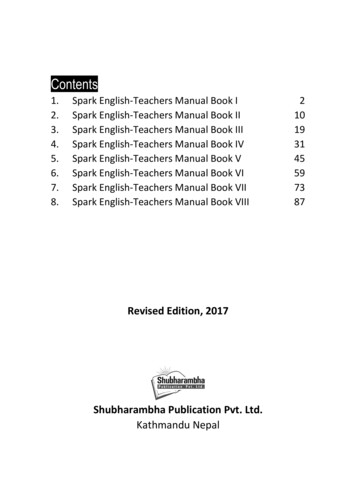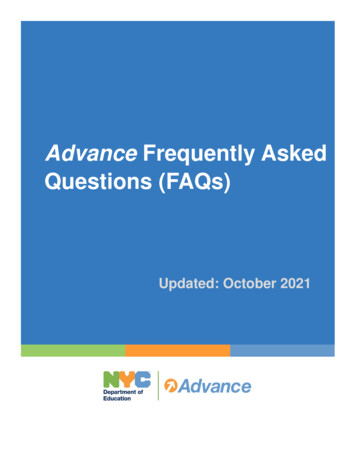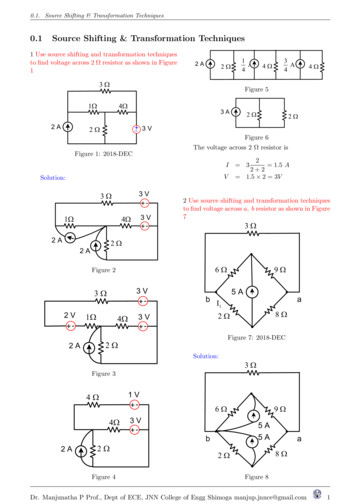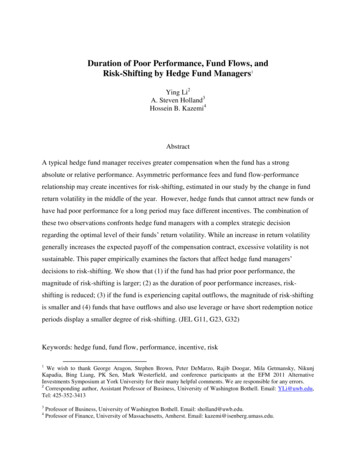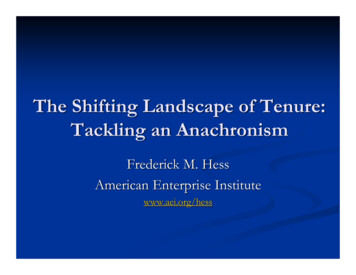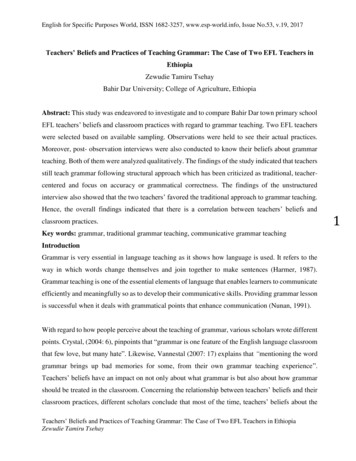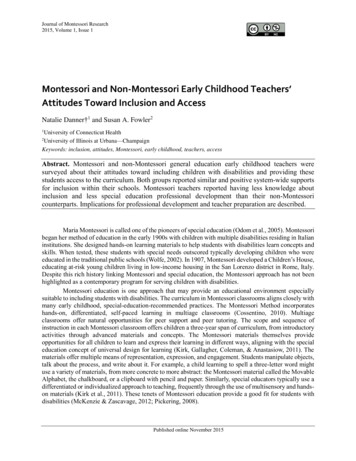
Transcription
SHIFTING THE FUTURE? TEACHERS ASAGENTS OF SOCIAL CHANGE IN SOUTHAFRICAN SECONDARY SCHOOLSChristina Lane CappyUniversity of Wisconsin-MadisonEmail: cappy@wisc.eduABSTRACTSouth Africa has risen to the forefront of educational debates that claim schoolingcan promote social justice and social cohesion. By drawing on Freire’s (1970)theory of critical pedagogy, this paper examines how South African teachers inrural and township schools encourage students to reflect critically upon their ownlives and take action to improve issues of inequality, violence, and insecurity. Itargues that teachers understand their roles as agents of social change primarilyas encouraging respect, morality, and racial reconciliation among learners. Theways in which the youth take up the teachers’ efforts to promote change dependsupon how the teachers’ practices speak to the students’ own life circumstances.When the youth relate to the teachers’ life stories and course material, they engagein the process of moral translation. In other words, the youth rework their lessonsinto ideas of how they should behave as moral human beings. Yet, frequentlyyoung South Africans do not learn a morality based on a Freirean notion of socialjustice – a seemingly central component to the national curriculum – but instead amorality based on individualised notions of personal responsibility and hope for abetter future. The paper concludes with several suggestions to improve educationalpractices for social justice.Keywords: social justice; morality; critical pedagogy; South Africa; collective action;secondary educationMrs Magwaza entered the classroom and began the first eleventh grade History classof 2014 in a direct way: ‘Let’s go straight to page 1’. She passed out copies of NewGeneration History (2012) so there was one shared textbook among three students.Despite sitting in a crowded classroom, the students listened quietly as their teacheruniversityof south africaEducation as ChangeVolume 20 Number 3 2016 pp. 119–140www.educationaschange.co.zaDOI: t ISSN 1682-3206 Online 1947-9417 2016 The Author(s)119Published by the University of Johannesburg and Unisa Press. This is an Open Access article distributed under the terms ofthe Creative Commons Attribution-ShareAlike 4.0 International License (https://creativecommons.org/licenses/by-sa/4.0/)
CappyShifting the future?continued. Mrs Magwaza started talking about communism and capitalism in preparationfor a segment on Russian history.‘I’m trying to show the characteristics of capitalism, so we can learn thecharacteristics of communism. Most of the capitalists ended up being so rich that theworkers, or proletariat, were exploited. How were they exploited?’. A male studentexplained that they are exploited because they get low wages. ‘Yes – workers endedup poor because they earned low wages. By the way, what is capitalism?’. A femalestudent read a definition from her book, then the teacher discussed the characteristicsof capitalism.‘That means communism was there to address the inequality in the country Incommunism the workers control the means of production Here in South Africa we areusing capitalism together with communism. Education and justice are in the hands ofstates, but other things are capitalism. Some countries adopt only one economic system,but other countries they adopt two. In communism all are equal with wealth. Is this thesame way here in South Africa?’.Mrs Magwaza reiterated these points in Zulu so that all of the students understood.Another male student responded that this is not the case in South Africa because somefactories are not under control of the state. She agreed and then gave an example of howthere are South African workers in gold mines, but the gold goes to the US and then itbecomes American Swiss gold chains and watches. South Africans do not benefit, sheasserted.She continued, ‘But you can change that, you. You can take back the AmericanSwiss and make it African Swiss If you are working for the government you can’thave your own business.But you can have people who are richer in South Africabecause they own their companies and businesses and farms, and people are exploitedby them’.In a context of high levels of inequality and racism, South African education hasbeen publicly tasked with promoting social justice, democracy, and social cohesion.While curricula and textbooks were re-written after apartheid to reflect the values ofthe new country, teachers play an oft-underappreciated role in fostering social change.As the excerpt above illustrates, this task is not lost upon many. Teachers like MrsMagwaza recognise their central role as influential educators of the next generationof South African citizens. Through pedagogical practices that encourage reflection onstudents’ environments, teachers may promote social transformation and help developrespect for others.This paper draws on Freire’s (1997 [1970]) theory of critical pedagogy to examinehow South African teachers in low-income schools encourage students to reflectcritically upon their own lives and take action to improve issues of inequality, violence,and insecurity. I ask the following questions: (a) how do teachers understand the roleof education in creating social change, (b) how do their understandings shape theirinstructional efforts, and (c) how do students take up teachers’ efforts to promote socialchange?120
CappyShifting the future?Based on fifteen months of ethnographic research in three rural and township schoolsin KwaZulu-Natal, South Africa, I argue that teachers understand their roles as agentsof social change primarily as encouraging respect, morality, and racial reconciliationamong learners. The ways in which the youth take up teachers’ efforts to promotechange depends upon how teachers’ practices speak to students’ own life circumstances.When the youth relate to teachers’ life stories and course material, they engage in theprocess of moral translation. In other words, the youth rework their lessons into ideasof how they should behave as moral human beings. Yet, more often than not, youngSouth Africans do not learn a morality based on a Freirean notion of social justice – aseemingly central component to the national curriculum – but instead a morality basedon individualised notions of personal responsibility and hope for a better future.This paper offers two contributions to debates on education for social change.First, it demonstrates that while some teachers agree with the South African curriculathat education should foster social change, their understandings do not translate intoencouragement of collective action. And second, by examining how the youth inrural and township schools engage in processes of moral translation, it illuminates thechallenges and potential of education to foster social transformation within unequalcontexts globally. By drawing on findings from this case study, this paper offers severalsuggestions to improve educational practices for social justice.TEACHING TOWARD TRANSFORMATION: FREIREANCRITICAL PEDAGOGYScholars have long recognised that education is not politically neutral. Socialreproductionist theorists have highlighted how schooling can reproduce racial andeconomic inequalities (Bourdieu & Passeron 1977; Bowles & Gintis 1976; Foucault1991 [1977]; Willis 1981 [1977]). They have demonstrated that despite a liberaldiscourse that proclaims education is based on meritocracy and can lead to socialmobility, it has the converse effect in practice. Yet, other scholars have demonstratededucation’s emancipatory potential and ability to produce critically engaged humanbeings (Apple 2010; Bush & Saltarelli 2000; Cole & Murphy 2010; Dewey 1916; Freire1997 [1970]; Giroux 2005; Greaney 2006). While critical and cautionary of the waysin which schooling can support oppressive power structures, these scholars argue thateducation can also transform society to create a more socially just world.Brazilian educator and theorist Paulo Freire recognised this dual potential ofeducation. In his seminal work, The Pedagogy of the Oppressed (1970), he argued thatalthough education often serves to maintain oppressive social orders, education mayalso be used to liberate people and transform society. Freire held that a person’s vocationis to create humanisation (1970, 25) – to live a fulfilled life based on equality andresponsibility to those around them. Drawing on Beldo’s (2014) definition of moralityas an ‘unconditional ought’, I argue that Freire’s philosophy holds a moral imperative121
CappyShifting the future?that education must create a better world. Freire’s philosophy does merely suggest thateducation could be transformative, but demands that education foster transformation.He supported critical conscientisation through education, wherein people reflect upontheir social situation so they may envision both individual and collective actions thatcan be pursued to improve their humanity and the humanity of those around them.Freire’s advocacy of education to further humanisation corresponds withcontemporary arguments of the need for education to foster social change throughdevelopment of ‘peacebuilding and social cohesion’. As Sayed and Novelli (2016,14) highlight, some may think that calls for peacebuilding and cohesion entail havingrespect for difference and how the ‘other’ thinks, yet they suggest these terms requirethe confrontation of historic inequities and drivers of conflict. The ‘strong’ perspectiveof teaching for social cohesion entails not only fostering feelings of trust and inclusion,but also addressing structural inequalities (Sayed & Novelli 2016, 35). Social justice istherefore central to this framework, just as it is in Freire’s argument that education shouldencourage reflection and change unequal social structures. Throughout this paper, ratherthan situate my analysis using strict definitions of contested terms like social cohesion,I examine how teachers employed themes inherent in these concepts when discussingtheir role as educators to promote change – for instance, how they viewed their jobs asfostering a shared identity, trust, and/or structural equality.In addition to presenting a framework for the purposes of education, Freire advocatedseveral pedagogical techniques to foster critical consciousness and collective action. Hewas highly critical of what he termed ‘banking education’, wherein teachers are seen asdepositing knowledge and skills into students. Through banking, students are presentedas ‘objects’ in the world to be integrated into society and structures of oppression, ratherthan subjects who can transform their world (1970, 53-5). Freire instead encourageddialogue and problem-posing as pedagogical techniques to foster social change. Whiledialogue sets teachers and students on equal footing, problem-posing engages peopleto recognise their social ‘situation’ that may be hindering their humanity, and thendiscover possibilities for change. These processes of reflection and action directed attransforming social structures occur simultaneously. Inherent in Freire’s emphasis onpedagogical practices is an understanding that teachers are in a unique position to act asagents of change to further efforts of social justice.Many scholars have explored the dimensions that enable or constrain teachers’agency to affect social change (Bartlett 2005; Bush & Saltarelli 2000; Horner et al.2015; Priestley, Biesta & Robinson 2013; Sayed & Novelli 2016). Like educationmore broadly, scholars have noted that teachers may act as agents of social equalityand justice, or as agents of conflict (Sayed & Novelli 2016, 36). They can promoteinclusiveness among pupils, or encourage social divisions based on ethnic, religious,racial or gender differences, among others. Moreover, as Priestley et al. (2013) detail,teachers adopt goals that may be long-term oriented like promoting social justice, orshort-term goals such as maintaining a normal classroom state. Their future orientationsshape the strategies they adopt in the classroom. And finally, teacher agency – be it to122
CappyShifting the future?promote equality, conflict, or class order – is conditioned in different ways accordingto their social, political, economic and cultural contexts (Priestley, Biesta & Robinson2013; Sayed Novelli 2016). Teacher agency may be constrained or facilitated by theirenvironment, including class size, violence, low wages, educational curricula, politicaladgendas, and exclusion or inclusion from decision-making concerning educationalpolicies. These historical and contemporary structures restrict or enable certain optionsavailable for teachers to enact their agency.While Freire has inspired educational reforms around the world, he has also beencriticised for universalist thinking that ignores variations of different socio-historicalcontexts, as well as issues of race and gender (Coben 1998). These critiques point toFreire’s inspirational goals rather than clear directives, and the challenges of applyinghis overarching methodology of conscientisation. However, many scholars have builtupon his notions of dialogue and problem-posing to examine a broad range of socialinequities and possibilities for change in unequal contexts.In South Africa, critical pedagogy has inspired a range of educational interventions,community-based research projects, and debates (Balwanz & Hlatshwayo 2015; Davis& Steyn 2012; Jackson 1997; Pillay 2014; Thomas 2009; Singh & Francis 2010).These studies have evaluated the use of critical pedagogy to address inequities of race(Davis & Steyn 2012), xenophobia (Singh & Francis 2010), and class (Balwanz &Hlatshwayo 2015). They point to the possibilities of using pedagogies that draw oncollaboration, critical reflection, and problem-posing to foster social justice in unequalsocieties. Yet, while case studies have examined the merits and limitations of criticalpedagogies in South Africa, many remain centred on higher education (Davis & Steyn2012; Pillay 2014; Singh & Francis 2010). Educators and researchers in institutionsof higher education have many more resources and opportunities in their educationalenvironments than educators from low-income schools. Because teacher agency isconditioned by context, teachers’ ability to enact positive transformation may be verydifferent in disadvantaged schools.Below I examine South Africa’s historical and educational context that framesteachers’ understandings of their role as agents of change, as well as their ability tofoster social change. I use Freire’s theory of critical pedagogy – and ultimate goalof education to improve humanity – as a backdrop against which to understand howteachers enact their agency. Through ethnographic fieldwork in historically black andlow-income schools in the country, this research sheds light on contemporary practicesand possibilities of teachers to act as agents of positive transformation.FROM SEPARATENESS TO SOCIAL JUSTICE: THEHISTORY OF EDUCATION IN SOUTH AFRICAThe South African government’s assertions that education should contribute toreconciliation and social justice must be understood against the backdrop of the country’s123
CappyShifting the future?turbulent and divisive past. Under apartheid South Africa, rather than promote equality,education functioned to differentiate people according to race. All people were labeledas white, black, coloured, or Indian and were required to attend racially segregatedschools. Resources were allocated unequally, with white schools receiving the greatestresources and black schools the fewest. This differential allocation of resources providedwhite students with an education that could lead them to higher paying jobs, whereasblack students’ education perpetuated their lower economic status (Fiske & Ladd 2004).Not only did apartheid education prepare black students with a manual educationand service-work skills for white-designated areas, but curriculum content served tojustify this unequal social order. Specific courses, such as History, taught Afrikaner volknationalism, which presented whites as superior and blacks as inferior (Engelbrecht2006). Rather than learn critical citizenship, non-white students were encouraged tosubmit to their subservient position as part of a natural social order. Apartheid educationalideology and practice further supported autocratic relations in schools, whereby orderand discipline trumped democratic practices of schooling (Hunt 2011).Despite government attempts to use schooling to maintain such an unequal socialstructure, many students and educators during apartheid sought to use education totransform society. For instance, Naidoo (2015) traces how Freirean-inspired radicalpedagogy was used by the South African Students Organisation (SASO) and the BlackConsciousness Movement (BCM) in the 1960s and 70s. SASO emphasised the role ofself-reflection through education; they wanted black students to think for themselvesand recognise their role as citizens (Naidoo 2015, 117). Although Naidoo furtherhighlights how the Freirean emphasis on critical reflection fell in tension with studentmovements that pushed forward a specific political agenda to end apartheid, her researchdemonstrates how critical reflection and action may exert positive transformations insociety – and ultimately social justice.Following the end of apartheid in 1994, the new South African governmentpublicly embraced the transformative potential of education in policy discourse.Whereas education under apartheid promulgated racial exclusion, the new governmenthas promoted education as a means to redress past inequalities and promote values ofthe new democracy. One of many influential publications, the Manifesto on Values,Education, and Democracy (2001) detailed the values that South African educationshould uphold, including: democracy, social justice, equality, non-racism, non-sexism,Ubuntu (human dignity), an open society, accountability (responsibility), the rule oflaw, and reconciliation. The manifesto continues to be a foundational framework foreducators in South Africa today with words and images of these values speckling thewalls of teachers’ offices.South African educational policy documents stress some subjects as promoting keyvalues (including social justice) more than others. For instance, the national curriculumframework, called the National Curriculum and Assessment Policy Statement (CAPS),highlights how History for grades 10-12 should support democracy by:124
CappyShifting the future?Upholding the values of the South African Constitution and helping people to understand thosevalues; reflecting the perspectives of a broad social spectrum so that race, class, gender andthe voices of ordinary people are represented; encouraging civic responsibility and responsibleleadership, including raising current social and environmental concerns; promoting human rightsand peace by challenging prejudices that involve race, class, gender, ethnicity and xenophobia;and preparing young people for local, regional, national, continental and global responsibility.(DBE 2011, 8)The language used above reveals several components also found in critical pedagogy –namely, that education should encourage students to reflect on social issues so that theymay become responsible citizens and leaders that uphold the value of human rights.Yet, while educational institutions and specific courses are now expected to promoteequality and human rights, South Africa’s contemporary education system is bifurcated– consisting of high performing former white and private schools on one side, and poorquality former black schools on the other. During the transition from apartheid, formerwhite schools opened their doors to pupils of all races, while semi-privatising, chargingschool fees, and accepting learners on the basis of exams determined by individualschool governing bodies (Motala 2008). Consequently, they have continued to excludethe most underprivileged learners despite becoming multi-racial institutions. Throughschool fees former white schools have hired additional and better-trained teachers,while most former black schools remain racially segregated and continue to face highstudent to teacher ratios with under-qualified staff. This situation is exacerbated inrural areas, where employment in local schools is viewed as a last resort for newlytrained teachers (Bantwini 2010). Moreover, students and staff in non-white schoolsare often faced with violence, either from community members or corporal punishment(Davids & Waghid 2016). These factors of violence and overcrowded classroomsserve to constrain teachers’ agency in former black school to enact their professionalgoals. Although contemporary pro-poor policies direct more state funds to schoolsin poor, typically all-black neighborhoods, learners in former white schools continueto outperform their peers in former non-white schools (Sayed & Motala 2012). As aresult, young people that pass through South Africa’s education system will experiencedramatically different life trajectories, raising important questions about how teachersand young people understand the role of education in fostering social transformation.METHODS AND FIELD SITESAs part of a larger project to examine how the youth learn values and morality throughschooling, I analysed how teachers recognise and act upon their role as agents of socialchange through fifteen months of ethnographic research in three schools in KwaZuluNatal. The schools were selected due to their varied levels of urbanisation (rural, periurban, urban), mid-range matric pass rates (40-80%) when compared to the nationalaverage, as well as their historical denotation as black or African schools. Rather than125
CappyShifting the future?strive to draw comprehensive comparisons across these field sites, my goal in selectingthese sites was to develop a fuller understanding of how teachers and the youth in themost common schools in the country learn values and ideas of how they might transformtheir environments. By drawing on data across schools I was better able to examinepedagogical techniques that could foster social change.These historically black, and still all-black, schools face challenges of poverty,insecurity, and violence on a daily basis. The rural school, Ikwezi High School1, lackedrunning water and educational resources, including textbooks and computers. Mostof the students were living with distant relatives who were primarily supported bygovernment social grants. Students at the peri-urban school, Entabeni Secondary School,often lived with one wage-earning family member, and the community was fraught withgang violence. Teachers and students alike lived in fear of the violence, which madeteaching and learning at times inconceivable. Siyabonga High School, an urban schoolnear Durban, boasted the greatest resources among these schools, including a computerlab and science lab, yet still had to navigate challenges of violence, drugs, poverty, andabuse from the surrounding community. Investigating the possibilities and limitationsof how educational processes may help create critical citizens who transform society isof vital importance in communities where change is not just an abstract ideal, but animperative for people to live fulfilling lives.In each site, I conducted participant observations, classroom observations, focusgroups, and interviews with teachers and students in order to understand how peoplelearn values and actions for social change. I observed Grade 11 English, History, andLife Orientation (LO) classes, focusing particularly on how teachers encouraged sharedvalues through selection of course material and teaching methods, and how studentsresponded to their efforts. During these subject periods, I would sit on the benches withstudents and take handwritten notes of class exercises. I also attended school activitiesincluding morning assemblies, cultural activities, matric balls, debate team events, andfootball matches, as these extracurricular activities can be as important as classroompractice in fostering social cohesion.All interviews and focus groups were conducted after at least six weeks of classroomobservation in order to limit the influence of my research topic on teaching practices,allow me to ask contextually specific questions, and develop rapport with teachers andstudents. Interviews and focus groups were ongoing while I conducted an additional twomonths of classroom observations. Teacher interviews aimed to uncover how teachersunderstand the role of education to create social justice and cohesion, as well as thechallenges they encounter in their everyday practice. These semi-structured interviewsfurther allowed teachers to communicate topics of interest to them.1All school, staff and student names used in this study are pseudonyms. Students selectedtheir own pseudonyms. This research received ethical approval from an Internal ReviewBoard, as well as from the KwaZulu-Natal Department of Education.126
CappyShifting the future?Student interviews and focus groups centred on how participants experienceinteractions with members of their community and values they learn in school. Forinstance, I asked students to reflect on specific class exercises to examine how theyfelt they learned values described in policies (democracy, non-racism, social justice)and other values that learners raised (respect, obedience, generational divisions). Eachfocus group met from one to three times, depending on student interest, with followup sessions aimed at clarifying ambiguities and expanding on initial themes. Studentinterviews were conducted after a student had participated in a focus group. In theseopen-ended interviews I simply asked students to tell me about their lives, which resultedin a wealth of information on students’ everyday life experiences, hopes, dreams, andchallenges that they sought to overcome. See Table 1 below for the number of male andfemale teacher interviews, as well as student focus groups and interviews conductedfor this study. All interviews were conducted in English and Zulu, and recorded withparticipant permission. They were later transcribed and coded for prominent themes.These in-depth methods allowed me to see not only what teachers assert as their role ineducation for peace, but how they act upon their beliefs within the constraints of theirenvironments.Table 1:Research participants in this study divided by genderParticipant CategoryMale Female Mixed4Teacher Interviews5Total975Student Interviews131225Total Student Participants463682Student Focus Groups719I felt that my status as a white female in racially charged environments at times createdbarriers between myself and students and staff. When I first arrived at each site, studentswere more likely to address me as ‘umlungu’ [white person], but after a few weeks theytransitioned to calling me by my first name. Over time I learned that many studentsthought that I was two to three years older than themselves, which in the case of theolder students was true. Because many of them had siblings my age, and due to myproclaimed status as a student (albeit graduate student), most youth regarded me as anolder peer mentor rather than a teacher. Many teachers likewise treated me as a ‘studentteacher’, offering me details of their teaching experience with less fear of repercussionsfrom their superiors. In addition, my identity as an American allowed me to distancemyself from historical and racial issues in South Africa, while my use of Zulu and thefact that I was living in the communities surrounding the schools (often with teachers)enabled me to develop a positive rapport with students and staff.127
CappyShifting the future?TEACHING FOR SOCIAL CHANGE? TEACHERS’PERSPECTIVESI think respect is one of the important values that our learners should have Maybe I’m doinglike a poem, a poem that will touch something in respect or comprehension, that will touchsomething in being accountable. So they are interpreting just like that. And then you go furtherand talk about accountability in their own lives now.(Mrs Nkosi, English teacher at Ikwezi High School)Many of the English, Life Orientation and History teachers perceived their role asagents of social change by teaching students how to live and behave in the world –both through curricular content and their pedagogical practices. Most of the teachersdescribed how they believed education in general, and their instruction in particular,should shape students’ individual behaviour so that they could distinguish between‘right and wrong’, respect others, and encourage racial reconciliation.Four of the nine teachers interviewed for this study asserted that they believed‘respect’ was the most important value that students should learn through education.Hammett and Staeheli (2011) critically note that South African teachers tended toemphasise respect in a unidirectional, and unequal manner. I too found this trend;most teachers told students to respect (and obey) their teachers as figures of authoritywithout highlighting their responsibilities as educators towards their students. Yet, somealso explained that students should respect themselves, as well as their peers. As MrsNkosi, the English teacher at Ikwezi explained, ‘[I]f they respect themselves they willknow how to respect other people. And if they are respecting they can go a long wayin life’. Other teachers, like the LO teacher at Entabeni highlighted how learning torespect could ‘alleviate the problem of discriminating against other ethnic groups Because if I respect you, I tolerate your values and principles as well’. Teachers statedthat they would spend a few minutes every lesson deliberately telling student that theyshould learn respect – a practice that I observed during classroom sessions and morningassemblies.
characteristics of communism. Most of the capitalists ended up being so rich that the workers, or proletariat, were exploited. How were they exploited?'. A male student explained that they are exploited because they get low wages. 'Yes - workers ended up poor because they earned low wages. By the way, what is capitalism?'. A female



